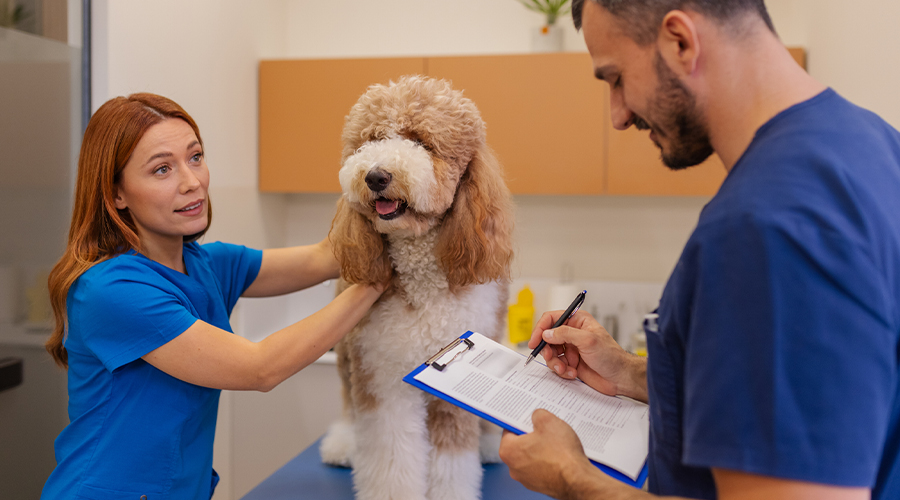

The customer is at the heart of every successful business, and this is no different for veterinary practices, more so perhaps as there are effectively two customers, the owner and their much-loved pet.
With a relationship built on care and trust, if this breaks down, disputes can occur which are likely to be stressful, costly, and damaging to the reputation of your practice.
Being proactive and resolving issues swiftly is therefore crucial to creating and maintaining good customer relationships.
Understanding the issues and your customer’s perspective
As a vet you’re expected to balance numerous roles, day to day animal care and diagnosis, surgical expertise and emotional support for owners, not to mention everything that goes with running a complex, regulated business.
Clients rarely see most of this and are driven by care and concern for their pet. Their primary focus is resolving whatever issue, illness or injury their pet is facing with high expectations of the outcome (which may not necessarily be realistic).
Following the RCVS Codes of Conduct for Veterinary Surgeons and Nurses, particularly in terms of communication, informed consent, and complaint handling, is best practice and will also protect your legal and professional standing.
Managing customer expectations and clear communication
Misunderstandings are the cause of many disputes. For veterinary practices this could include unexplained or unexpected costs, a lack of understanding about treatment options or unexpected outcomes following treatment or surgery. Many of these can be prevented with early, clear communication.
- Terms of Business: Provide clear, accessible terms covering payments, referrals, complaints, and withdrawal of treatment. Make these openly available and highlight any changes regularly.
- Fees and estimates: Be open about costs, providing clear information about fees and how they are calculated. Always provide estimates (in writing wherever possible) before starting treatment so the customer is aware, including ancillary costs such as medication, tests and VAT. Make sure customers understand that estimates are not fixed quotes and may change due to complications or changes in treatment. Obtain consent to your estimate in writing wherever possible and note clearly if consent is refused.
- Informed consent: This can be difficult, especially in emergency cases but it’s important to explain treatments and procedures clearly, including associated risks and any alternatives that are available. Keep a record of these conversations and obtain consent before treatment begins.
Managing difficult situations with sensitive communication
Difficult conversations, such as poor prognoses, high treatment costs, or end-of-life care, are sadly inevitable. However, handling them sensitively and clearly can reduce the risk of disputes and reputational damage.
- Take time to listen: It’s important for clients to feel heard, especially in an emotional situation where their pet may be gravely ill or injured or they are potentially facing difficult decisions in terms of end-of-life care. Taking just a few minutes to listen shows empathy and can diffuse tension and prevent complaints.
- Communicate regularly: Short, clear updates when a pet is in your care or you have information about their health demonstrates to clients that their pet and their wellbeing is important to you.
- Follow-Up: Checking in after treatment may be a small gesture but it shows a genuine interest and care about the client and their pet which will build loyalty, and discourage dissatisfaction. It’s also an opportunity to nip any issues in the bud before they escalate.
Adopt a consistent approach throughout your team
Pet owners are likely to engage with multiple people in the practice, from receptionists and nurses to vets and practice managers. A customer focused approach makes the client feel valued and other individuals may spot an issue early, allowing it to be dealt with before it escalates.
- Internal reporting: Actively encourage your wider team to identify any issues and put a procedure in place to report any concerns so they can be dealt with promptly and so that everyone is aware of any issues
- Staff training: Make sure staff are trained on how to manage complaints and that it’s clear when to refer issues and who they should be referred to. Many issues can be resolved on the front line if handled sensitively.
Make sure your records are accurate and up to date
If a complaint occurs, having accurate and up to date records will be your strongest line of defence.
- Clinical notes: Record all treatment decisions, fee discussions, and consent promptly so records are up to date and to avoid any confusion. If these are handwritten, make sure they are legible and clear so that anyone supporting the complaints process can understand them..
- Client interactions: Log all important conversations, especially difficult ones. Make sure they are stored safely and with clear reference to the date, topic of conversation and outcome. Memories can change over time but your recorded notes will provide clarity.
Ensure your complaints are handled professionally
Every business will encounter complaints. By implementing a fair and transparent complaints process, you can prevent a minor concern escalating to a major dispute.
- Be proactive and resolve issues early: Make it easy for clients to raise concerns – often, listening and offering an explanation resolves the issue
- Be transparent: Make sure your complaints procedure is openly available and clearly outlines the steps and timelines for formal complaints. Bear in mind that the process may be reviewed by the RCVS or a judge in the future. Maintain a professional tone, keep to the facts and make sure you meet any deadlines outlined in the procedure.
- Consider mediation: The Veterinary Client Mediation Service (VCMS) is a free, independent service funded by the RCVS. Actively suggesting mediation to resolve an issue demonstrates transparency and may lead to the complaint being resolved without legal involvement.
Seek legal advice if needed
Not every dispute will be resolved easily. If a matter has escalated, such as threatening legal action or demanding compensation, don’t ignore it. Make sure your insurer is notified, even if you think the complaint isn’t justified. They may provide support, and you may also be able to access legal advice through your policy. Having a conversation with a veterinary legal specialist will help you to understand the situation and what your next steps should be.
Conclusion
Good customer relationships are built on clear communication, empathy, and professionalism. By managing expectations, listening actively, and responding promptly, it’s possible to prevent many disputes and resolve others before they escalate.
If a complaint does happen, having a well-prepared team, detailed records, and expert legal advice will reduce the impact on yourself and the practice as a whole.










